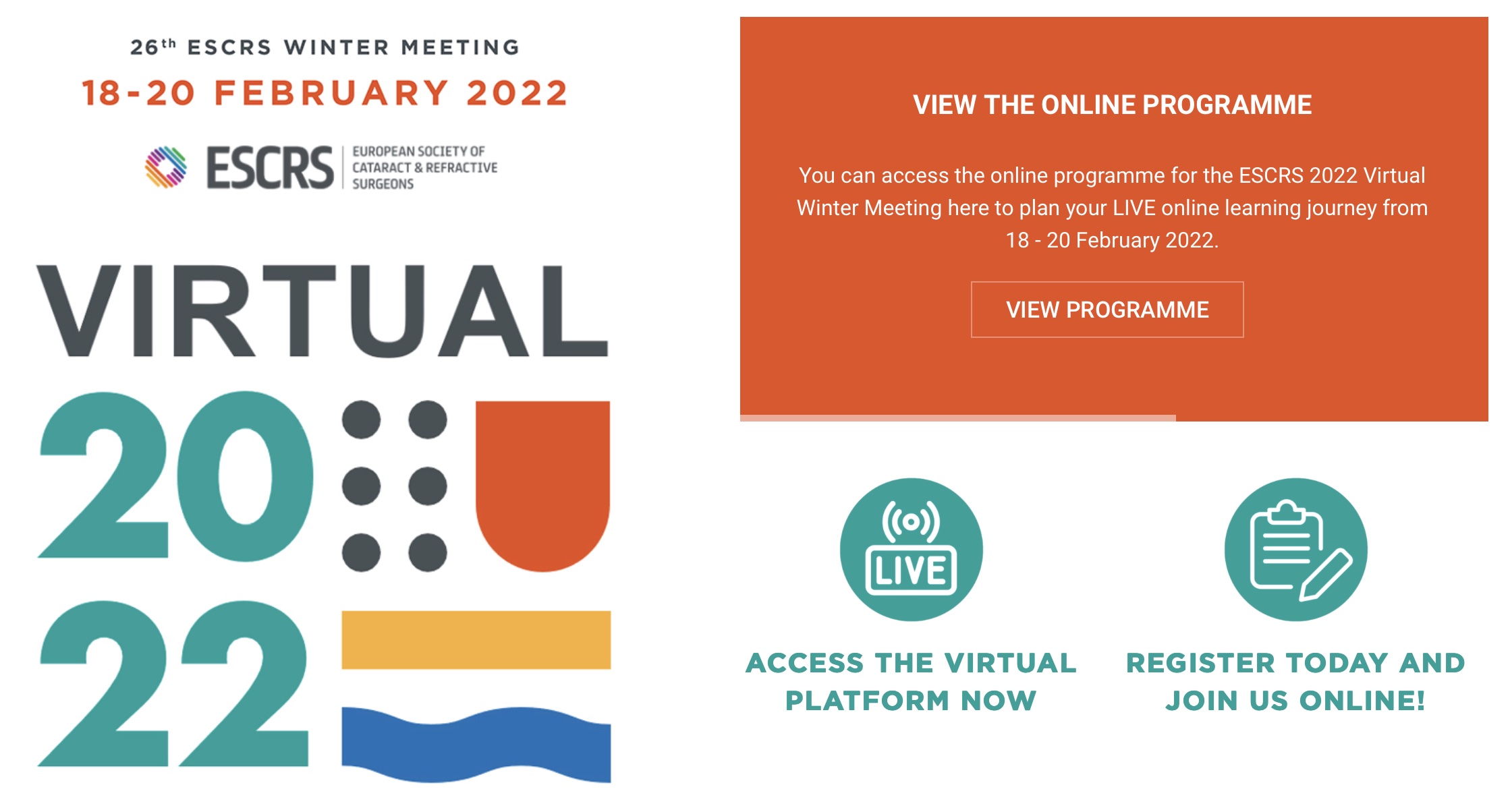After the last ESCRS in Amsterdam 2021 could be held in real again for the first time, this year's winter meeting will now take place as a pure virtual event. We have looked through the meeting program for you and picked out the highlights of the contributions that relate to the digital transformation of ophthalmology. Let's go!
Friday, 18th February 2022:
Title: Modelling visual function, future developments
Session: Basic Visual Optics Course - Part 1, 8:30-10:50
Speaker: Pablo Artal, Spain
Summary: Pablo Artal gives an overview of the future development of models of visual function. Promising!
Title: The impact of distance learning during home confinement on the increased incidence of myopia in children during the covid-19 pandemic
Session: Refractive: Cornea, 8:30-10:00
Speaker: Sebnem Egriboyun, Turkey
Summary: Sebnem Egriboyun provides a look at the downside of digitization and increasing myopia, particularly among children, in relation to exposure to displays in the context of digital education during the COVID-19 pandemic. Surprisingly, the authors find no increased rate of progression of myopia in the age groups studied since during the lockdown period. Let's see what else is to come in the next few years. Maybe after so much screen time the children were finally out in the fresh air more often?
Title: Ray-Tracing simulations with an astigmatic pseudophakic eye model and a generic simulated toric iol
Session: Toric IOLs. Astigmatism Correction. IOL Power Calculations, 10:30-12:00
Speaker: Catarina Coutinho, Portugal
Summary: Now it becomes completely digital. Catarina Coutinho reports on how her group developed an astigmatic Personalized Pseudophakic Eye Model using Zemax software that can incorporate patient-specific data. This model was then used to simulate ray-tracing analyses. The results are promising! Also of interest: www.zemax.com.
Title: Digital dry labs and simulator training to start your surgical career
Session: Cataract Didactic Course - Part 1, 14:15-16:45
Speaker: John Ferris, United Kingdom
Summary: John Ferris gives an overview of so-called digital dry labs as an alternative to conventional wet labs, e.g. on pig eyes, using completely digital simulators. Thus, a variety of different cases can be simulated and adapted to the respective skills of the trainee.
Title: Evaluation of a telemedicine web-based visual acuity e-health tool in cataract patients
Session: Cataract surgery: Оutcomes & New Screening and Diagnostic Modalities. Miscellaneous, 15:15-16:45
Speaker: Joukje Wanten, Netherlands
Summary: In this study, the Easee web-based tool is compared to conventional visual acuity testing in patients undergoing cataract surgery. The web-based tool does not perform badly, but there are slight differences to the conventional visual acuity tests.
Title: Meet dora: user acceptability study of automated telephone follow up post cataract surgery
Session: Cataract surgery: Оutcomes & New Screening and Diagnostic Modalities. Miscellaneous, 15:15-16:45
Speaker: Sarah Khavandi, United Kingdom
Summary: The research group investigates the acceptance of automated telephone follow ups using the Artificial Intelligence Assistant "Dora" among patients after cataract surgery. The acceptance is very good and in the future Dora could help to further improve efficiency, safety and patient satisfaction in the healthcare system.
Saturday, 19th February 2022:
Title: Implementing Patient Education Apps -Sense or Nonsense
Session: Adapting new technologies– Why it‘s worth it!, 13:00-14:00
Speaker: Amir Abdul Hamid, United Kingdom
Summary: Amir Abdul Hamid provides an overview of whether it makes sense to implement patient education apps into one's clinical routine - or not? Certainly a contribution worth watching!
We hope to give you a small overview of the exciting digital projects at ESCRS (poster sessions were not reviewed). We wish you a lot of fun with the virtual ESCRS Winter Meeting and are looking forward to meeting you in real at the ESCRS in Milan in autumn!




